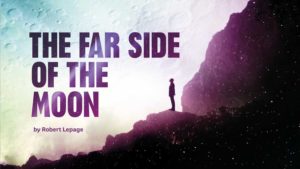
It is a rare opportunity to see Ex Machina, company of renowned theatre maker Robert LePage, perform outside of London in the UK, and the opportunity to see such a trailblazer of theatre practice first hand. The Far Side of the Moon, originally conceived and performed by LePage himself, now in the more than capable hands of Yve Jacques.
LePage, founded Ex Machina in 1994 and quickly gained attention with their early works notably The Seven Streams of the River Ota (1994) and Elsinore (1995). LePage’s work fuses styles and disciplines, he does not characterise Ex Machina as a theatre company, and nor does his work, either in performance or in film does not slot easily into traditional descriptions. LePage has become known for his fusing of film and performance, of multimedia across his work- video projections, soundscapes and projected dialogue sit alongside puppetry and performance and choreography. Meanwhile his interests as an artist similarly span multifaceted and multimedia approaches incorporating science alongside philosophy and art. It is fitting then, in 1999 when beginning work on The Far Side of the Moon, it was the question of science alongside art that is a catalyst to the narrative.
In parallel narratives- one public, the story of the space race, one private, the story of two brothers, LePage explores the nature of humanity, and the direction of life. The story unfolds of two brothers, one gay one straight, one confident, one shy, the younger seemingly successful, the younger still struggling. Their domestic narrative is played out against the backdrop of the Space Race and younger brother Phillipe’s endless fascination with the cosmonauts, pitted against their ever more glamorous American counterparts the American Astronauts. The parallels between the struggling student and his glamorous and famous weather presenter brother are clear.
The storytelling is tightly woven, and complex, veering across Phillipe and Andre’s lives, touching on their childhood and adolescence, through their current situations and frustrations. It is a highly domestic, family oriented tale at its heart with everything circling back to the death of their Mother, and the realisation of what life is like without any parents.
The technical elements of the show are, as expected, astounding. In the hands of a lesser company the might come off as gimmicky, but here the fusion of projections alongside The performance is truly theatrical in its reliance on Jacques performance to encapsulate both brothers and a variety of peripheral characters, but also in the use of stage and props in a very traditional way. Although LePage is perhaps best known for his fusing of film and theatre, here although the film and multimedia elements are moments of brilliance, it is moments of simple theatricality that highlight the skill and attention to detail in the performance. When an ironing board becomes a bike, for example, and later a bed, or when through subtle costume change and mannerism Jacques becomes another character. The brilliance of LePage’s work is the fusion of these elements, and despite being a work of technical precision, it also has a very instinctual, organic feel that comes back to the engaging storytelling at its heart.
As LePage’s creation is always about fusion of elements, the bringing together of The Far Side of the Moon rests on the performance of Jacques. An intimidating ask to take on the very personal story that LePage wrote- he draws on his own Mother’s death, as well as hinting at his personal struggles with depression and coming to terms with his sexuality- as well as taking on the piece that LePage performed himself. However, Jacques having toured this piece for several years, has an easy stage presence which makes the precision performance of both hitting technical markers to allow projection, puppeteer or set to take over the storytelling, while also delivering two hours of single-handed narration while embodying Andre and Phillipe’s characters. Jacques does it with an engaging personable warmth that also brings the audience into what for those uninitiated might see as the daunting prospect of LePage’s theatrical world.
Robert LePage sets out to create fusion in his work- fusion in performance through multimedia, traditional and innovation, and through thematically, addressing issues side by side that might not traditionally be addressed. These elements alone could be a cold exercise in performance for performance sake, experimentation for experimentation’s sake which could leave the average audience alienated. It is the credit of LePage and the company that his work does not do this, while The Far Side of the Moon is a great introduction to the theatrical style Le Page is known for, while it is a challenging fascinating study of performance methods, it also keeps at it’s heart the element of storytelling. So while audiences may be intrigued, puzzled and hopefully challenged by seeing what may be a new approach to theatre for them as this work tours the UK and the world, they will also be invited in, and moved by, the story that facilitates the performance.
http://lacaserne.net/index2.php/theatre/the_far_side_of_the_moon/
